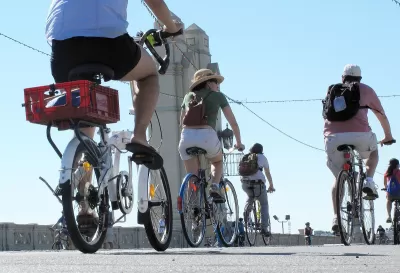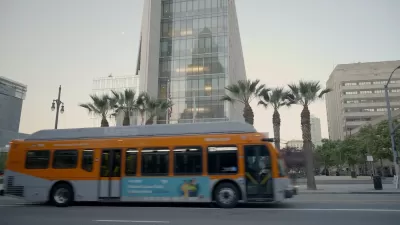Despite the program’s success across the region and rising production costs, Los Angeles-area events could receive less funding in the coming year.

In an opinion piece in Streetsblog LA, Wes Reutimann, Special Programs Director and co-founder of the Pasadena Complete Streets Coalition and ActiveSGV, praises the region’s expansive Open Streets program, which includes events like CicLAvia and Beach Streets that have grown in size and scope since they first launched in 2010.
“Beloved by local families and Angelenos from all walks of life, these family-friendly experiences provide the public with a fleeting snapshot of what a more sustainable, multi-modal Southern California could look like.” So, Reutimann asks, why is LA Metro proposing slashing open streets funding by as much as 40 percent? Reutimann points out that the cost of producing events is rising, with insurance costs and safety considerations adding significant costs that will be hard to make up through private sponsorship.
Reutimann argues that “The value of Open Streets has never been greater,” bringing together community and helping California promote multimodal, sustainable transportation. “After a decade, Metro should be sponsoring about one Open Streets event a month, highlighting the county’s rich diversity and its expanding and improving public transit system. The level of continued investment required to reach this goal – just $2-3 million per year above where it is now – is peanuts to an agency that routinely approves cost overruns for highway projects in the tens of millions.”
FULL STORY: Los Angeles Loves “Open Streets” Events – So Why Would Metro Slash Funding?

Study: Maui’s Plan to Convert Vacation Rentals to Long-Term Housing Could Cause Nearly $1 Billion Economic Loss
The plan would reduce visitor accommodation by 25,% resulting in 1,900 jobs lost.

North Texas Transit Leaders Tout Benefits of TOD for Growing Region
At a summit focused on transit-oriented development, policymakers discussed how North Texas’ expanded light rail system can serve as a tool for economic growth.

Why Should We Subsidize Public Transportation?
Many public transit agencies face financial stress due to rising costs, declining fare revenue, and declining subsidies. Transit advocates must provide a strong business case for increasing public transit funding.

How to Make US Trains Faster
Changes to boarding platforms and a switch to electric trains could improve U.S. passenger rail service without the added cost of high-speed rail.

Columbia’s Revitalized ‘Loop’ Is a Hub for Local Entrepreneurs
A focus on small businesses is helping a commercial corridor in Columbia, Missouri thrive.

Invasive Insect Threatens Minnesota’s Ash Forests
The Emerald Ash Borer is a rapidly spreading invasive pest threatening Minnesota’s ash trees, and homeowners are encouraged to plant diverse replacement species, avoid moving ash firewood, and monitor for signs of infestation.
Urban Design for Planners 1: Software Tools
This six-course series explores essential urban design concepts using open source software and equips planners with the tools they need to participate fully in the urban design process.
Planning for Universal Design
Learn the tools for implementing Universal Design in planning regulations.
City of Santa Clarita
Ascent Environmental
Institute for Housing and Urban Development Studies (IHS)
City of Grandview
Harvard GSD Executive Education
Toledo-Lucas County Plan Commissions
Salt Lake City
NYU Wagner Graduate School of Public Service





























